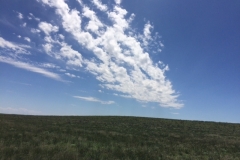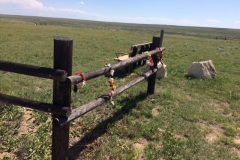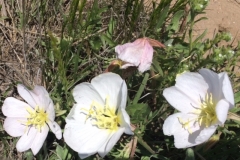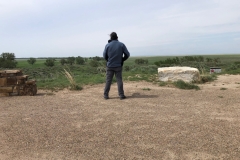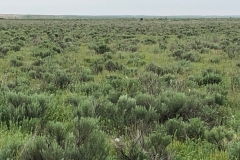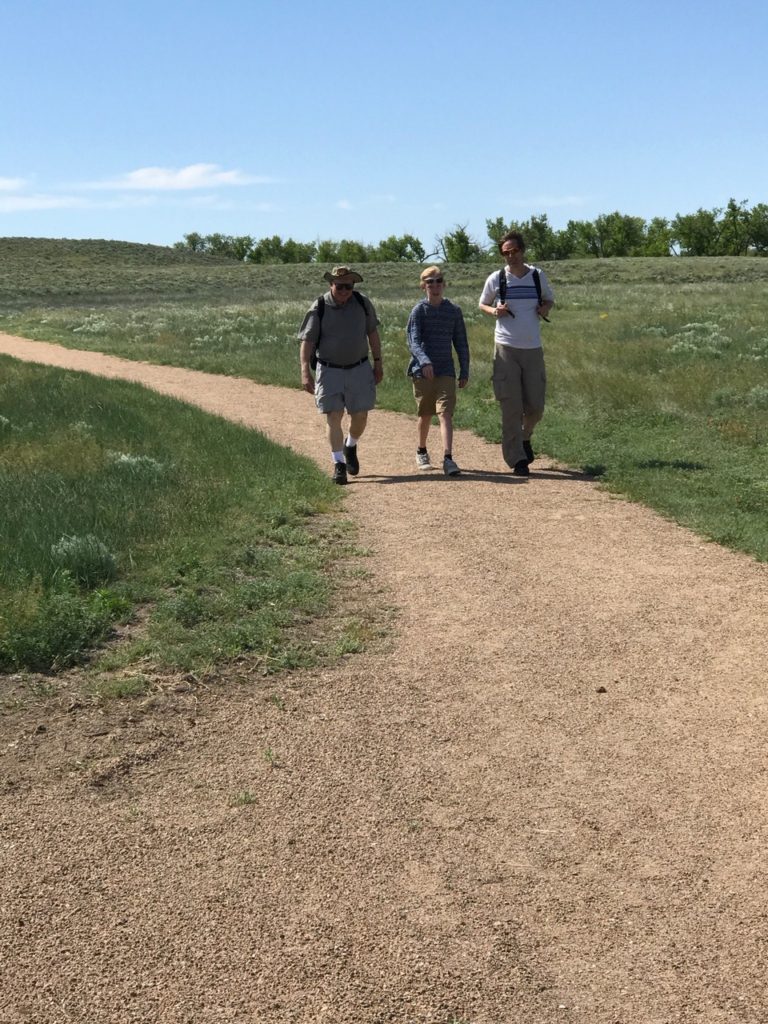
“Standing on the sacred ground at Sand Creek is sobering. While the wind blew through the trees, I watched the birds flying in the sky and couldn’t stop thinking about the souls who died, running for their lives, on that cold winter day in November 1864…Yet, the Arapaho and Cheyenne went to Sand Creek because they were told to do so. I felt the betrayal deep in my bones and heart…I was surprised to learn that the Sand Creek historic site is the only federally recognized site with the word “massacre” in the name rather than “battle”.” (Carol Park, Gunbarrel, Colo., participant in 2024)
“…Thank you for facilitating the Pilgrimage to Sand Creek…The highlight of the experience for me was hearing [Arapaho elder] Fred Mosqueda speak…Thank you for the shoulder bag with the journal, pen, brochure, colored cord, and field guide…Breaking into small groups to talk, both after part of the presentation and at lunch was valuable.”
(Laurie Rugenstein, Boulder, Colo., participant in 2023)
“Thank you, thank you, thank you! I have been wanting to make the pilgrimage for years now and was so very grateful to have a group to join…I also greatly appreciated the “homework” and follow-up invitation.”
(Osha Waters, Niwot, Colo., participant in 2023)
“What I loved the most was the sense of being in the story, not as a past thing, not as a far away thing, but very much as a now thing. Fred [Mosqueda]’s presence and the way he speaks draws me into it a very different place than the dramatics of the [NPS] ranger talk. Both are important, to see the story from different points of view and to accept them with a bit more equanimity. At the end, when we read the names [of massacre victims], was a powerful time for me. I felt a sense of release, a letting go of judgment and separation…My sense of identity shifted.”
(Sarah Hartzell, Boulder, Colo., participant in 2023)
“The 3 of us who were together were very moved…Even though we know the story, it’s always a reminder of what people are capable of if they are not in this world with an open heart…It was special to have Fred and Mary [Mosqueda] there this year. “
(Connie Shelley, Ft. Collins, Colo., participant in 2019 and 2023)
“Our pilgrimage to Sand Creek started for us from southern CO…Walsenberg to be exact. As we drove out on Hwy 50, we began to prepare ourselves for the day. However, nothing can quite prepare you for the strange, stark, haunting reality that is the site of the massacre. How does one prepare to learn about, remember and honor something so terrible, anyway? Neither of us knew a great deal about what took place at Sand Creek not that long ago. The day was planned perfectly. We had a very informative and moving time listening to Marrty and an NPS ranger describe the details of that dreadful day, as well as the political/religious machinations and pressures that led to it. There was plenty of time for reflection and contemplation, as well. The time we spent at Sand Creek was moving and challenging, as well as a reminder of the dark capacities we carry as humans. And yet the day did not leave us in despair. There is a substantive presence in this place that continues to witness to the possibilities of our troubled human race to overcome such barbarism, to live in a world of mutual respect, care and freedom. We would recommend this pilgrimage to any and all! Thank you, Marrty, for your commitment to help all of us remember.”
(Chris Bollegar, Erie, Colo., & Susie Adcock, Littleton, Colo., participants in 2021)
“The actual experience of walking on those sacred grounds has a much greater impact than it did when I read about the Massacre and saw it reproduced in the PBS series ‘Centennial’ over 40 years ago. Just being there gives the event a greater feeling of reality — yes, this actually did happen — than watching a film. Or perhaps, one complements the other, as I could view in my mind the pleas of one of the chiefs (White Antelope or Black Kettle (?)) holding the U.S. flag and the white flag of truce, as I’m looking out over the scene in real life. In any event, I want to thank Marrty for his efforts to make this a very memorable and moving experience. I appreciated both his own research and commentary, as well as hearing the Ranger give his poignant overview of the event, suggesting that we can’t forget how such evil resides in the hearts of people who can’t get beyond their own bigotry and racism. If we dehumanize others, we leave ourselves open to dehumanizing ourselves.”
(Andy Drance, Aurora, Colo., participant in 2019)
“Thank you for the open invitation on your pilgrimage! I had a very thought- and heart-provoking experience. Like any pilgrimage, I keep thinking about what I learned and felt there. I’ve been encouraging others to go there and have told others about what I learned…I really enjoyed having the whole day to reflect and ponder and the pace was perfect…Thanks again for taking us to this important site, sharing your thoughts, and sending us music and video ahead of time!”
(Brenda Mehos, Boulder, Colo., participant in 2019)
“When I first met Marrty Dormish, I was thrilled to learn he conducted an annual pilgrimage to the Sand Creek Massacre site. As a Colorado native and having studied the American West as a student in college, I read several publications and opinions regarding the Sand Creek Massacre but never visited the site. Now, after finally travelling to the southeast corner of the state, my depth of understanding of this horrific event is more deeply rooted than ever before. My husband, 13-year old son and I took the trek with Marrty and our experience was truly an awakening. The atrocities against the Cheyenne and Arapaho took place over 150 years ago, however, our visit transcended my knowledge from written words into a spiritual experience — as I felt the cool chill in the air that day, heard the wispy howl of the wind, and reflected upon the numerous lives that were so violently murdered by Colonel Chivington and his men. Marrty’s pilgrimage is a rare opportunity to pay homage to these individuals who senselessly lost their lives. This tragic event in American history undoubtedly warrants our time and attention.”
(Mary Jo Guarrero, Broomfield, Colo., participant in 2018)
“Early in June, we drove to the far southeast border of Colorado for a day of expanding our minds and hearts. As long-term Coloradans, we had heard for years about attempts to preserve the site of the massacre of Native Americans at Sand Creek. Distance, weather, inertia and ignorance had prevented our learning more, until we heard about the pilgrimage Marrty Dormish was planning. The recordings and books he recommended helped prepare us for the on-site time with two different guides and perspectives on the events at Sand Creek…As we walked and listened and observed, Marrty’s unobtrusive guidance opened our awareness of our complex national history, and led us to respect and honor those who died here. Thank you, Marrty…and fellow pilgrims.”
(Phyllis & Bill Klein, Littleton, Colo., participant in 2016)
“We must wrestle with our own history as a country—both the good and the bad, the beautiful and the ugly. Stories like the Sand Creek Massacre and pilgrimages to such places where injustices were perpetrated help us in so many ways…They help us listen to a narrative different from our own. And when we do so, we develop compassion and empathy. Out of compassion and empathy grows a commitment to justice and to being part of God’s kingdom plan to set all things right under our present and future King of Kings. Along the way, you discover new heroes like Silas Soule…who inspire you to continue the good fight.”
(Jay Lorenzen, If Properly Led Gettysburg Leadership Experience, participant in 2016)


